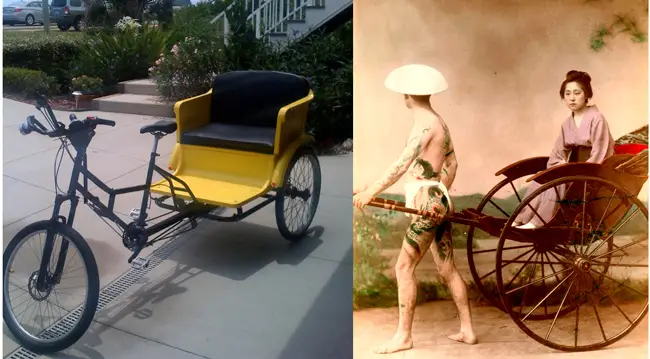
The first known use of the word “rickshaw” in the English language dates back to the 1879 edition of a pamphlet on the Japanese language called “Exercises in Yokohama Dialect,” where the translation for “man-powered carriage” and “two-wheeled pony carriage” was translated as “gin ricky-pshaw” and “mar gin ricky-pshaw.” The San Francisco Chronicle used the word three years later without the hyphen.
The first known use of an actual rickshaw in Flagler County may happen as early as next month when Daniel Barrett plans to offer his bicycle rickshaw service on the beach-side in Flagler Beach, anywhere between the Intracoastal and the 40 blocks between 20th Street North and 20th Street South. Barrett got the Flagler Beach City Commission’s approval Thursday evening to run the business from his Flagler Beach home, though the rickshaw itself will be kept at a different location, and customers won’t be coming in and out of his home on North Oceanshore Blvd.
“It fits in good with the city, the ambiance of the city,” Commissioner Ron Vath said.
Rickshaw services may be associated with danger and the poor in Asia, where some cities have tried to ban the service because of the numerous accidents it’s provoked. It was also, during Asia’s grimmer colonial period, associated with the rich or with westerners profiting—literally in rickshaws’ cases—off the back of the poor, who’d be paid pennies for their transportation services. But that was then.
These days the rickshaw is almost commonplace in larger cities. New York City has hundreds—so many that the city last year cracked down on rickshaw operators by demanding that they all be licensed. San Francisco, Denver and even Fort Lauderdale have rickshaw services, most of them bicycle types, though the traditional “pedicab”—with an operator walking fast or running with the rickshaw in tow—is also still in use, to a lesser extent.
Barrett was a rickshaw operator for Fort Lauderdale’s Ocean View Rickshaw for three years until he moved to Flagler Beach three years ago. He calls it an “eco-community taxi service.” Larger cities charge about $1 a minute for the service. He won’t be charging that much. His fees are likelier to be between $5 and $10 for a typical ride. He’s doesn’t have to turn a profit: he has a full-time job (the 10-hour-a-day kind, four days on, four days off, which will allow him to spend many hours on Flagler Beach’s streets), “but it’s something that I wanted to do.”
Riders will be able either to call him or to hail him as he rides by. Barrett expects that riders will be as interested in traditional taxi service as they will in riding the rickshaw for the sake of riding a rickshaw, the romance of it, or the romance of each other: the rickshaw seats two.
Won’t it wear him out? “It’s like anything else,” Barrett says. You get used to it, you get in shape for it.” And if riders happen to be on the heavier side, as they can be with America’s swelling girth, there are 21 gears to choose from.
The service isn’t available yet: Barrett wanted to secure all the necessary paperwork first. A phone number will post here as soon as the service is available, likely in August. Meanwhile the certified boat captain, and, given his experience, certified rickshaw driver, can be reached at [email protected]





























PCer says
This is so fun. We had them down in Coconut Grove when I was a kid. But they were with runners, not bikes. The guys were crazy and would do crazy stunts, making it as much of a thrill ride as anything else. I hope he is able to expand into Town Center once it gets going.
kmedley says
This is a wonderful added service for Flagler Beach. My husband and I have taken advantage of these services in Key West. It’s a great way to get around and enjoy the local surroundings.
celestinewolf says
I’m so excited to hear of this project. Hats off to Mr. Barrett for his willingness to share his experience. My family looks forward to reducing our carbon footprint and just enjoying the ride.